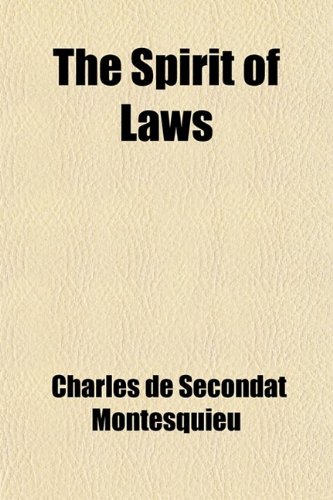Items related to The Spirit of Laws (Volume 1); Including D'Alembert'...

Book may have numerous typos, missing text, images, or index. Purchasers can download a free scanned copy of the original book (without typos) from the publisher. 1899. Excerpt: ... OF LAWS IN RELATION TO COMMERCE, CONSIDERED IN THE REVOLUTIONS IT HAS MET WITH IN THE WORLD HOUGH commerce be subject to great revolutions, yet it is possible that certain physical causes, as the quality of the soil, or the climate, may fix its nature forever. We at present carry on the trade of the Indies merely by means of the silver which we send thither. The Romans carried annually thither about fifty millions of sesterces; a and this silver, as ours is at present, was exchanged for merchandise, which was brought to the West. Every nation that ever traded to the Indies has constantly carried bullion and brought merchandise in return.6 It is nature itself that produces this effect. The Indians have their hearts adapted to their manner of living. Our luxury cannot be theirs; nor theirs our wants. Their climate demands and permits hardly anything which comes from ours. They go in a great measure naked; such clothes as they have the country itself furnishes; and their religion, which is deeply rooted, gives them an aversion for those things that serve for our nourishment. They want, therefore, nothing but our bullion to serve as the medium of value; and for this they give us merchandise in return, with which the frugality of the people and the nature of the country furnish them in great abundance. Those ancient authors who have mentioned the Indies describe them just as we now find them, as to their policy, customs, and marners.c The Indies have ever been the same Indies they a Pliny, lib. VI. cap. xxiii. c See Pliny, book VI. chap, xix., and b Seei Pausanias, " Laconia," tine III. Strabo, book XV. 1.--Some general Considerations are at present; and in every period of time those who traded with that country carried specie thither and brought none in return. 2.--Of the People of Afri...
"synopsis" may belong to another edition of this title.
About the Author:
CHARLES-LOUIS DE SECONDAT, the jurist and political philosopher, was born at the Château de La Brede, near Bordeaux, France, on January 18, 1689. He attended the Oratorian College of Juilly and then studied law in Bordeaux from 1705 to 1708. Upon his father's death in 1713, he assumed the title of baron de La Brede and was appointed counselor of the Bordeaux parliament (1714). In 1716 he inherited his uncle's title of baron de Montesquieu, and also his office, serving as the deputy president of the parliament from 1716 to 1726. Montesquieu's first major work, Lettres persanes (Persian Letters), was published in 1721 and became a huge success. Supposedly written by two Persian travelers in Europe, Montesquieu satirized French institutions. In 1725 he published Le Temple de Gnide (The Temple of Gnide). Because of the success of Persian Letters, in 1728 Montesquieu was elected to the French Academy, the French lit-erary academy established by Cardinal de Richelieu in 1634 to maintain standards of literary taste and to establish the lit-erary language. That same year, seeking to complete his education by foreign travel, he set out on a grand tour of Europe, particularly England, where he remained from 1729 to 1731. In 1734 Montesquieu published Considerations sur les causes de la grandeur et de la decadence des Romains (Thoughts on the Causes of the Greatness and the Downfall of the Romans), one of the first important works in the philos-ophy of history. Montesquieu's greatest work, De l'esprit des lois (The Spirit of Laws), was published in 1748. It is a comparative study of three types of government: republic, monarchy, and despotism. Montesquieu held that governmental powers should be separated and balanced to guarantee individual rights and freedom. Attacked by the French clergy and his enemies at the Sorbonne, Montesquieu responded with Défense de "l'esprit des lois" (Defense of "The Spirit of Laws") in 1750. His last work, Essai sur le gout (Essay on Taste) was not completed. Montesquieu died in Paris on February 10, 1755.
"About this title" may belong to another edition of this title.
- PublisherGeneral Books LLC
- Publication date2012
- ISBN 10 1458905845
- ISBN 13 9781458905840
- BindingPaperback
- Number of pages158
(No Available Copies)
Search Books: Create a WantIf you know the book but cannot find it on AbeBooks, we can automatically search for it on your behalf as new inventory is added. If it is added to AbeBooks by one of our member booksellers, we will notify you!
Create a Want
